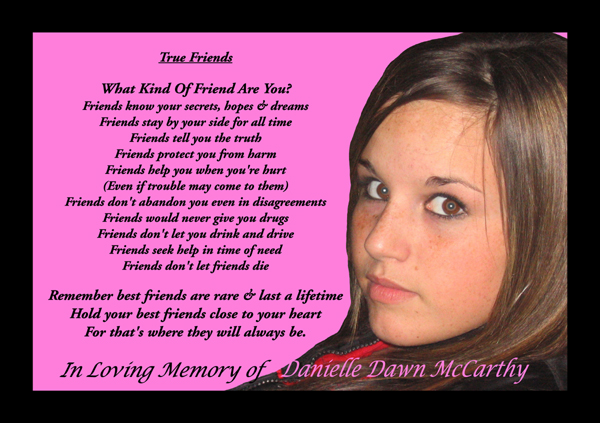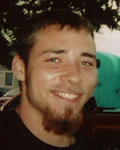
Welcome To Our Site
FRIENDS DON'T LET FRIENDS DIE.COM

Participate in our forum
Ask The White House
State and Federal Drug Laws
Regarding Death or Serious Injury
Drug Enforcement Administration(DEA)
Drug Trafficking Penalties
Patchwork of Penalties
Find your State's Statutes
Contact your Congressman
Senator or Governor
Crime Victims
Bill of Rights and Compensation
About This Site
State News
Chat
Our Children
Click on a name below to see their page
Danielle McCarthy
Washington
Christi Nowak
Georgia
Anke Furber
Georgia
Levi Wren
Washington
Ephrain Schultz
New York
Mark R Ellis
Rhode Island
Sean P. Efford
New Mexico
Caitlyn Brady
New Hampshire
Katty McGuire Andrea
Washington
JP Faulk
Florida
Michael Miller
Massachusetts
Chuck Tabaka
Wisconsin
Miranda Daly
California
Jamie Leavitt
Washington
Kaylin Marie Mathews
California
RJ Davis
Alabama
Billy Grandchamp
Rhode Island
Nicholas Werhofnik
Georgia
Rebecca Marks
New York
Dustin Kueter
South Dakota
Chase Denver Julian
Louisiana
Katelynn Porter
Ontario,Canada
Tony Trujillo
Colorado
Billy Joe Towle Jr.
Michigan
Kelley Wilson
Alabama
Rhiannon Fraser
Florida
Vivianna Satterfield
New Mexico
Kelli Laine Lewis
South Carolina
Taylor Smith
Georgia
 Danielle cherished family, friends and life. She had her whole life planned
out; her husband, number of kids, two dogs and would be a dermatologist, a career
where she could help others but have time for her family.
Danielle cherished family, friends and life. She had her whole life planned
out; her husband, number of kids, two dogs and would be a dermatologist, a career
where she could help others but have time for her family.  Christi had just enrolled in college. She just began taking First Baptist Church
shuttles downtown every Thursday to befriend the homeless. Just chit chatting
with them and letting them know they had a friend. In her journals, she was
determined to turn her life around and she started by helping others. She volunteered
often for the M.U.S.T. Ministries to help set up their clothing shop for the
homeless and the children's center. She helped cooked their meals. She helped
do their laundry. She wanted to go into a field helping others. She would have
changed at least one person's life, for the better, when they thought there
was no more hope. She didn't show up last Thursday. She died.
Christi had just enrolled in college. She just began taking First Baptist Church
shuttles downtown every Thursday to befriend the homeless. Just chit chatting
with them and letting them know they had a friend. In her journals, she was
determined to turn her life around and she started by helping others. She volunteered
often for the M.U.S.T. Ministries to help set up their clothing shop for the
homeless and the children's center. She helped cooked their meals. She helped
do their laundry. She wanted to go into a field helping others. She would have
changed at least one person's life, for the better, when they thought there
was no more hope. She didn't show up last Thursday. She died.  In the months before she was killed, 21-year-old Anke Furber had been acting
scared and she seemed to know she was in danger. Several days after Furber's
charred remains were discovered in a small vineyard in Norcross, Anke's mom,
Ria, found a note in Anke's desk at home in Marietta. In it, Anke seemed to
foreshadow her own death. She wrote, "My parents would surely grieve the loss
of their wonderful daughter whose craziness would soon lead to her slaughter".
Ria isnt sure exactly when the note was written, but believes it was written
in a close time frame to the actual murder.
In the months before she was killed, 21-year-old Anke Furber had been acting
scared and she seemed to know she was in danger. Several days after Furber's
charred remains were discovered in a small vineyard in Norcross, Anke's mom,
Ria, found a note in Anke's desk at home in Marietta. In it, Anke seemed to
foreshadow her own death. She wrote, "My parents would surely grieve the loss
of their wonderful daughter whose craziness would soon lead to her slaughter".
Ria isnt sure exactly when the note was written, but believes it was written
in a close time frame to the actual murder.  At 22 years old, Levi had goals and ambitions of being a business owner, a husband
and a father. He loved his family and friends with everything in him and would
do anything for you. His shyness and manners we're a shining attribute to who
he was. Unfortunately, Levi befriended someone who for nearly three years took
advantage of his kindness and when asked to leave his home, he killed him. If
he would have just walked out the door as asked, Levi would still be here today.
We'll never know all the wonderful things that Levi would have accomplished,
but we know he was a "Friend" till the end.
At 22 years old, Levi had goals and ambitions of being a business owner, a husband
and a father. He loved his family and friends with everything in him and would
do anything for you. His shyness and manners we're a shining attribute to who
he was. Unfortunately, Levi befriended someone who for nearly three years took
advantage of his kindness and when asked to leave his home, he killed him. If
he would have just walked out the door as asked, Levi would still be here today.
We'll never know all the wonderful things that Levi would have accomplished,
but we know he was a "Friend" till the end.  Ephraim was 21 yrs old when he prematurely transitioned to the other side. He
was a very warm hearted young man. And was always available to help friends
and family. As his cousin Ben said about him: "You can lay a 1,000. on the table
and know completely that Ephraim would have never taken it". He spent most of
his days at Antique World in Clarence , NY which was owned and operated by his
Uncle. That was my sons world. A world he will no longer be able to participate
in. He is sorely missed by his family and friends.
Ephraim was 21 yrs old when he prematurely transitioned to the other side. He
was a very warm hearted young man. And was always available to help friends
and family. As his cousin Ben said about him: "You can lay a 1,000. on the table
and know completely that Ephraim would have never taken it". He spent most of
his days at Antique World in Clarence , NY which was owned and operated by his
Uncle. That was my sons world. A world he will no longer be able to participate
in. He is sorely missed by his family and friends.  Mark suffered a brain injury at the age of 19 the night of a high school prom.
Mark died at the age of 25. Life was hard for Mark, he lived an aphasic life.
Mark struggled to relearn his alphabet and to speak again. Neuro rehab, drug
rehab, jails, institutions and death. Mark was disabled and a fighter all at
the same time. College, heavy equipment operator, volunteering were all part
of these six years. Mark loved kids and wished he had one. Due to the selfish
reasoning of his so called friends, Mark will never be able to achieve his dreams
that he fought so hard for. Mark's struggle is over !! PEACE..........
Mark suffered a brain injury at the age of 19 the night of a high school prom.
Mark died at the age of 25. Life was hard for Mark, he lived an aphasic life.
Mark struggled to relearn his alphabet and to speak again. Neuro rehab, drug
rehab, jails, institutions and death. Mark was disabled and a fighter all at
the same time. College, heavy equipment operator, volunteering were all part
of these six years. Mark loved kids and wished he had one. Due to the selfish
reasoning of his so called friends, Mark will never be able to achieve his dreams
that he fought so hard for. Mark's struggle is over !! PEACE..........  His friends describe him as a kind, warm hearted, full of energy, always smiling,
and a very silly young man. They also said that whenever Sean walked into a
room that he had the ability lighting up the room because he was full of life
and energy! He loved his dad, his mom, and his sister very much. He had a very
special bond with his great grandma Efford and his great aunt Charlene whom
also up in heaven with him. A warm hug from Sean was just another way that he
showed his affection to his family and friends
His friends describe him as a kind, warm hearted, full of energy, always smiling,
and a very silly young man. They also said that whenever Sean walked into a
room that he had the ability lighting up the room because he was full of life
and energy! He loved his dad, his mom, and his sister very much. He had a very
special bond with his great grandma Efford and his great aunt Charlene whom
also up in heaven with him. A warm hug from Sean was just another way that he
showed his affection to his family and friends  When Cayte was in the middle school she was on the track team, she was a cheerleader
for the Nor-Roc Vikings, she was on a soccer team, and she loved attending the
dances at the Sad Cafe. When she went to high school, all of those activities
stopped. The sad reason was because she was too old. All the kids have, once
they reach high school, are the woods and the homes of friends when the parents
are at work. If she had activities to do after school when she went to high
school, maybe this wouldn't have happened.
When Cayte was in the middle school she was on the track team, she was a cheerleader
for the Nor-Roc Vikings, she was on a soccer team, and she loved attending the
dances at the Sad Cafe. When she went to high school, all of those activities
stopped. The sad reason was because she was too old. All the kids have, once
they reach high school, are the woods and the homes of friends when the parents
are at work. If she had activities to do after school when she went to high
school, maybe this wouldn't have happened.  From her birth to her passing Katty touched so many lives. Not only did her
family have the joy of watching her grow from a 6 pound baby girl to a beautiful
young woman, but so many others did as well. The lives she touched are too many
to fathom. Her beauty and grace preceded her where ever she went. Her heart
was made of fine gold and she cared for others always before herself. She was
not just special to all of us but to the Lord who saw fit to call her home at
such a young age. Her mansion was ready! When we think of Katty now we all can
be at peace because we know she is with her Lord, never to face this harsh world
we live in day to day. She is with us always when we remember her smile, her
touch, and her kind words. We all had the pleasure of being touched by an ANGEL!
From her birth to her passing Katty touched so many lives. Not only did her
family have the joy of watching her grow from a 6 pound baby girl to a beautiful
young woman, but so many others did as well. The lives she touched are too many
to fathom. Her beauty and grace preceded her where ever she went. Her heart
was made of fine gold and she cared for others always before herself. She was
not just special to all of us but to the Lord who saw fit to call her home at
such a young age. Her mansion was ready! When we think of Katty now we all can
be at peace because we know she is with her Lord, never to face this harsh world
we live in day to day. She is with us always when we remember her smile, her
touch, and her kind words. We all had the pleasure of being touched by an ANGEL! We want our son's name to be Remembered and to bring hope and joy out of something
that has been the darkest and heartbreaking days of our families life. JP was
very out spoken and we have decided to be that way on this site and to be his
voice about the drug companies and the public official's that sit back and do
nothing. If we could save one person from what our family had to go Through
and is still going Through, it would be all worth it We will not stop until
the truth gets out. We want his memory to live on.
We want our son's name to be Remembered and to bring hope and joy out of something
that has been the darkest and heartbreaking days of our families life. JP was
very out spoken and we have decided to be that way on this site and to be his
voice about the drug companies and the public official's that sit back and do
nothing. If we could save one person from what our family had to go Through
and is still going Through, it would be all worth it We will not stop until
the truth gets out. We want his memory to live on.  Time has gone by so quickly and it seems like we haven't seen your face in forever.
Our hearts are broken, our tears flow so freely and our souls feel empty. Michael,
you left us with so many happy memories but the memories can never take your
place. We know you and your uncle Sam are saving a place for those who cherished
you the most.
Time has gone by so quickly and it seems like we haven't seen your face in forever.
Our hearts are broken, our tears flow so freely and our souls feel empty. Michael,
you left us with so many happy memories but the memories can never take your
place. We know you and your uncle Sam are saving a place for those who cherished
you the most.  Two weeks before he died, Chuck called me on the phone. He was excited to tell
me he was joining the National Guard. He had begun to think about being a History
Teacher. He planned to attend school after basic training. He also mentioned
a new girlfriend. He was pretty crazy about her but wanted to give things a
little more time before making her "meet the parents". Still, we made plans
to meet for lunch once July wound down. He thought we might all get together
and told me not to worry, he had a job and would help pay the check. The first
time I met the young lady he was so crazy about was as she cried herself senseless
over his casket. She laid a broken heart chain and necklace across his hands.
She wore the mating half around her slender neck. Her courage in court helped
to solidify the deal that sent a drug dealer to prison. I hope she, and Chuck's
other friends, make the right decision and swear off drug use so we may never
see their faces on these pages.
Two weeks before he died, Chuck called me on the phone. He was excited to tell
me he was joining the National Guard. He had begun to think about being a History
Teacher. He planned to attend school after basic training. He also mentioned
a new girlfriend. He was pretty crazy about her but wanted to give things a
little more time before making her "meet the parents". Still, we made plans
to meet for lunch once July wound down. He thought we might all get together
and told me not to worry, he had a job and would help pay the check. The first
time I met the young lady he was so crazy about was as she cried herself senseless
over his casket. She laid a broken heart chain and necklace across his hands.
She wore the mating half around her slender neck. Her courage in court helped
to solidify the deal that sent a drug dealer to prison. I hope she, and Chuck's
other friends, make the right decision and swear off drug use so we may never
see their faces on these pages.  Everyone ever touched by Miranda. This will be a tribute to the life she lived.
She was the most remarkable and inspirational woman I have ever known. I was
in awe of my own daughter. Even as her mother, her beauty took my breath away,
and as she walked this earth from her crawling stages to adulthood her beauty
from the inside amazed me. Miranda loved about every living thing and each friend
she had she made her relationship with them special and unique.
Everyone ever touched by Miranda. This will be a tribute to the life she lived.
She was the most remarkable and inspirational woman I have ever known. I was
in awe of my own daughter. Even as her mother, her beauty took my breath away,
and as she walked this earth from her crawling stages to adulthood her beauty
from the inside amazed me. Miranda loved about every living thing and each friend
she had she made her relationship with them special and unique.  Jamie was a very loving son, brother, grandson, nephew, boyfriend and friend..
Most importantly he was the best father anyone could have asked for.. Even though
he was only 16 when he was taken away from us from his so called friend, he
did everything for his daughter and mother of his daughter that he had
asked to marry him when he turns 18.. Jamie was the type of kid that would take
his shirt off his back for anyone that needs it.. Jamie died on April
23, 2008.. If only his so called friend (29 yrs old), his mother and the other
people at the home called 911 instead of waiting 3 hours, he would still be
here with us today.. Jamie's dad passed away Nov 2005 and he had a hard time
dealing with loosing his father and could not believe he was gone.. Well now
Jamie is at home with his dad..Until we meet again... I am proud of you my son..Love
you always and forever, Mommy
Jamie was a very loving son, brother, grandson, nephew, boyfriend and friend..
Most importantly he was the best father anyone could have asked for.. Even though
he was only 16 when he was taken away from us from his so called friend, he
did everything for his daughter and mother of his daughter that he had
asked to marry him when he turns 18.. Jamie was the type of kid that would take
his shirt off his back for anyone that needs it.. Jamie died on April
23, 2008.. If only his so called friend (29 yrs old), his mother and the other
people at the home called 911 instead of waiting 3 hours, he would still be
here with us today.. Jamie's dad passed away Nov 2005 and he had a hard time
dealing with loosing his father and could not believe he was gone.. Well now
Jamie is at home with his dad..Until we meet again... I am proud of you my son..Love
you always and forever, Mommy  Kaylin Marie Mathews was born on a Tuesday March 1, 1988. Kaylin was my oldest
child and my only daughter. She could play the piano, guitar, and drums and
loved to sing. She had been "spinning records" the last few years and loved
to mix music. She had been working as a d.j. at the time of her death and was
very good. Kaylin was an only child for 71/2 years. She has one brother and
one sister. She was a talented writer. She made jewelry and she could draw.
There was nothing that my baby couldn't do, if she wanted to. Kaylin was left
to die in a ravine on June 30, 2008. She was found on July 1, 2008. Her date
of death is listed as a Tuesday July 1, 2008. She was 20 years old. I miss her
every second of every day. The world lost an amazing talent and an amazing young
woman. I lost a part of my heart.
Kaylin Marie Mathews was born on a Tuesday March 1, 1988. Kaylin was my oldest
child and my only daughter. She could play the piano, guitar, and drums and
loved to sing. She had been "spinning records" the last few years and loved
to mix music. She had been working as a d.j. at the time of her death and was
very good. Kaylin was an only child for 71/2 years. She has one brother and
one sister. She was a talented writer. She made jewelry and she could draw.
There was nothing that my baby couldn't do, if she wanted to. Kaylin was left
to die in a ravine on June 30, 2008. She was found on July 1, 2008. Her date
of death is listed as a Tuesday July 1, 2008. She was 20 years old. I miss her
every second of every day. The world lost an amazing talent and an amazing young
woman. I lost a part of my heart.  R.J. was truly a blessing in our lives. He was the kind of son that most parents
only dream of having. He always respected and obeyed his parents and never got
in trouble. RJ was never in trouble in his life RJ always called home to let
us know where he was and when he would be home. When he was missing and we couldn't
reach him on his cell phone, we knew immediately something terrible was wrong.
This is a nightmare that no parent should have to go through and we are living
it. Our concern is not what we are going through, but what our son had to go
through in his final moments of life.
R.J. was truly a blessing in our lives. He was the kind of son that most parents
only dream of having. He always respected and obeyed his parents and never got
in trouble. RJ was never in trouble in his life RJ always called home to let
us know where he was and when he would be home. When he was missing and we couldn't
reach him on his cell phone, we knew immediately something terrible was wrong.
This is a nightmare that no parent should have to go through and we are living
it. Our concern is not what we are going through, but what our son had to go
through in his final moments of life.  William Michael Grandchamp better known as Billy, was born Nov 7,1979. HE was
a only child. Billy had many friends. Billy often told his friends that his
MOM was his best friend. Billy liked to collect sports attire like jerseys and
sports caps.Everything he wore had to match. He was meticulous with his clothing,
car, and home. Although, Billy had no children of his own he loved children.
He told me his greatest wish was to find a good girl and settle down and have
a family. That seemed to be very important to him. Even at a young age he had
a gift with children. Billy's friends have always commented on how good he was
with their children and how their children loved him. Billy was loved by so
many people. He had over 800 friends and family members at his wake. Billy will
be greatly missed by all his family and friends.
William Michael Grandchamp better known as Billy, was born Nov 7,1979. HE was
a only child. Billy had many friends. Billy often told his friends that his
MOM was his best friend. Billy liked to collect sports attire like jerseys and
sports caps.Everything he wore had to match. He was meticulous with his clothing,
car, and home. Although, Billy had no children of his own he loved children.
He told me his greatest wish was to find a good girl and settle down and have
a family. That seemed to be very important to him. Even at a young age he had
a gift with children. Billy's friends have always commented on how good he was
with their children and how their children loved him. Billy was loved by so
many people. He had over 800 friends and family members at his wake. Billy will
be greatly missed by all his family and friends. 


 Chase lived life spontaneously with the freedom of a butterfly – a free spirit
& soul – no one could hold him down, except his baby girl. She was his LIFE.
There wasn’t anything he wouldn’t do for her, including getting clean. Chase
was clean 1.5 yrs, after 6 months in residential rehab in New Orleans, continued
with NA meetings, substance abuse group counseling, and sought out a Navy recruiter
who told him all he would have to do to be eligible. He seemed to be on his
way, until he fell off the wagon 12 days out of jail. Turning to heroin again
to deal with stress was the mistake of his life. “Chase’s Story” is shared with
you on his main page. Thanks for taking time to read it. Sincere and heartfelt
thanks to the FDLFD Family for taking us under their wings. “They will sing
me to them, and I will hear.” ~RIP Chase~4evrYng~1985-2009
Chase lived life spontaneously with the freedom of a butterfly – a free spirit
& soul – no one could hold him down, except his baby girl. She was his LIFE.
There wasn’t anything he wouldn’t do for her, including getting clean. Chase
was clean 1.5 yrs, after 6 months in residential rehab in New Orleans, continued
with NA meetings, substance abuse group counseling, and sought out a Navy recruiter
who told him all he would have to do to be eligible. He seemed to be on his
way, until he fell off the wagon 12 days out of jail. Turning to heroin again
to deal with stress was the mistake of his life. “Chase’s Story” is shared with
you on his main page. Thanks for taking time to read it. Sincere and heartfelt
thanks to the FDLFD Family for taking us under their wings. “They will sing
me to them, and I will hear.” ~RIP Chase~4evrYng~1985-2009  Katelynn Lillian Porter, 16, of West Elgin, was killed in a car crash on Dunborough
Rd. in Elgin County. “In loving memory of Katelynn Porter. 12/12/09. 9:40 p.m.”
is written between two hearts on the roadside memorial, a makeshift cross. Porter
was a student at West Elgin secondary school, where officials are trying to
come to grips with the news of her death, especially so close to Christmas.
Katelynn Lillian Porter, 16, of West Elgin, was killed in a car crash on Dunborough
Rd. in Elgin County. “In loving memory of Katelynn Porter. 12/12/09. 9:40 p.m.”
is written between two hearts on the roadside memorial, a makeshift cross. Porter
was a student at West Elgin secondary school, where officials are trying to
come to grips with the news of her death, especially so close to Christmas.
 Tony passed away 10 days after his 16th birthday. He asked permission to spend the night at his friends and I told him yes. I told him" I love you" and he replied "I love you too Mom. Tony was the kid who wanted to make everyone laugh. He had such a wonderful sense of humor and a big heart. He would talk to his friends for hours trying to help them solve their problems. He was a loving big brother, and a wonderful son. He would help you with anything without even being asked. Tony was an extremely intelligent child. He was always placed in advanced classes. A week before he passed we received a letter from Columbine informing us that Tony was nominated to participate in their advanced English Program. He had a gift for writing stories.
Tony passed away 10 days after his 16th birthday. He asked permission to spend the night at his friends and I told him yes. I told him" I love you" and he replied "I love you too Mom. Tony was the kid who wanted to make everyone laugh. He had such a wonderful sense of humor and a big heart. He would talk to his friends for hours trying to help them solve their problems. He was a loving big brother, and a wonderful son. He would help you with anything without even being asked. Tony was an extremely intelligent child. He was always placed in advanced classes. A week before he passed we received a letter from Columbine informing us that Tony was nominated to participate in their advanced English Program. He had a gift for writing stories.


 She loved all things technical and mechanical with her older brother Ian and fashion and decorating days with her older sister Genevieve. She loved Gothic country art, the workings of the human body, video games, driving and her new tattoo machine. She loved swimming and surfing. She loved all things living and loved her dog Timpleton and her parrot Thermopolis. She had a strong heart and soul, was an independent and progressive thinker, open minded and a will power like no one else. Her favorite place to go was Barnes and Noble.
She loved all things technical and mechanical with her older brother Ian and fashion and decorating days with her older sister Genevieve. She loved Gothic country art, the workings of the human body, video games, driving and her new tattoo machine. She loved swimming and surfing. She loved all things living and loved her dog Timpleton and her parrot Thermopolis. She had a strong heart and soul, was an independent and progressive thinker, open minded and a will power like no one else. Her favorite place to go was Barnes and Noble.
 Vivianna Satterfield was 15 years old! Vivi was the type of young lady that put other people in front of herself. She would always say "Peace and Love".
Vivianna Satterfield was 15 years old! Vivi was the type of young lady that put other people in front of herself. She would always say "Peace and Love".
 Kelli Laine Lewis is my only daughter. Kelli died when she was 18 after attending a party hosted by 3 adults who offered a $5.00 entry fee to come and drink all you wanted. A pretty tempting offer for teens not old enough to buy alcohol.
Kelli Laine Lewis is my only daughter. Kelli died when she was 18 after attending a party hosted by 3 adults who offered a $5.00 entry fee to come and drink all you wanted. A pretty tempting offer for teens not old enough to buy alcohol.
 Growing up – she had it all. She was smart and witty - she could come up with a jovial comeback in almost any conversation or situation. She wShe was smart and witty - she could come up with a jovial comeback in almost any conversation or situation. She was always photographing everything and always laughing. She had an infectious laugh, loud and squeaky, but incredibly endearing. Taylor was a huge fan of Tyler Perry’s Madea. She owned every play and knew every word to every gospel song in the plays. She would sing them at the top of her lungs to anyone that would listen. as always photographing everything and always laughing. She had an infectious laugh, loud and squeaky, but incredibly endearing.
Growing up – she had it all. She was smart and witty - she could come up with a jovial comeback in almost any conversation or situation. She wShe was smart and witty - she could come up with a jovial comeback in almost any conversation or situation. She was always photographing everything and always laughing. She had an infectious laugh, loud and squeaky, but incredibly endearing. Taylor was a huge fan of Tyler Perry’s Madea. She owned every play and knew every word to every gospel song in the plays. She would sing them at the top of her lungs to anyone that would listen. as always photographing everything and always laughing. She had an infectious laugh, loud and squeaky, but incredibly endearing.
 He went out THE FIRST TIME to celebrate being "LEGAL" with a creep he considered a friend (even though we warned him this guy was not a true friend). My son did not drive so he was picked up about ten thirty. Even when it was obvious my son was having difficulties this creep brought him to his own house , which is 4 houses away for a few hours, and dropped him off here at home in the middle of the night WITHOUT KNOCKING OR CALLING OR WAKING US UP. We found Ben in his bed the next morning when we tried to wake him.
He went out THE FIRST TIME to celebrate being "LEGAL" with a creep he considered a friend (even though we warned him this guy was not a true friend). My son did not drive so he was picked up about ten thirty. Even when it was obvious my son was having difficulties this creep brought him to his own house , which is 4 houses away for a few hours, and dropped him off here at home in the middle of the night WITHOUT KNOCKING OR CALLING OR WAKING US UP. We found Ben in his bed the next morning when we tried to wake him.
Click here to Meet
Our Parents
  Click above to visit Our Sites |
Click on the name below to see full story
|
North Carolina News:
|
Fuquay Varina Father Fights For Justice And Wins David Klein says he has finally found some relief after Tamitha Hicks Gilchrist plead guilty to second degree murder for the death of his son Taylor in April 2006. "If you supply drugs to somebody and they die, you could be charge with second degree murder," Klein explained. "It's a law in North Carolina." Klein said Taylor, 18, went to Gilchrist's house in Fuquay to get drugs. It's the next part of the story that he says continues to haunt him. "Taylor became ill and sick and went into a coma. Instead of calling 911 or taking him somewhere they let him die," Klein said. "They then put him in a ditch in Fuquay." At first, the Wake County Sheriff's Department called the death a drug overdose, blaming no one. But Klein didn't back down. Klein hired a lawyer and private investigator, while also asking the District Attorney for help. This effort paid off when the DA took Gilchrist, 42, into custody in April 2008 - two years after Then came Gilchrist's guilty plea on May 4 of this year. "We got her off the street for 10 years," Klein said. "I don't know if there's justice but she's off He hopes his struggle to get a drug dealer behind bars saves the lives of other teens, and says "Do something now. If you have a child into drugs do it now!" Klein said. "Don't wait until Klein says a load has been lifted, but the pain of his loss still remains stronger than ever. There are other men involved with leaving Taylor's body in a ditch, and Klein says they may face criminal charges in the future as well. Victim�s family asks why accused heroin dealer is free
Staff photo | David Reynolds
Danielle Guinn (left), 18, and her parents, Betsy
and John McIntosh, say Renee Guinn (in picture), 21,
was struggling to put her addiction to prescription
medications behind her. Renee Guinn overdosed on
drugs, including heroin, on Nov. 9 and died days
later.
By David Reynolds Staff Writer
Published: Sunday, January 4, 2009 at 5:05 p.m.
Last Modified: Sunday, January 4, 2009 at 11:14 p.m. This summer Renee Guinn moved back home to stay with her parents in Carolina Beach and get her life back together, her mom and dad say. The 21-year-old from Carolina Beach had been away at college and then working. Her parents say she drank alcohol and experimented with illegally-obtained prescription drugs � and she was trying to put that behind her. Back home, she worked as a waitress, went to Narcotics Anonymous meetings, and didn�t complain when her parents � John and Betsy McIntosh � surprised her with a drug test. �She had a plan to return to college after getting rid of her ghosts,� Betsy McIntosh said. Her daughter seemed to be doing well, she said, enjoying life while deciding how to spend the rest of it. Now her parents are wondering how their daughter�s life disappeared so fast. On Nov. 9, Guinn, 21, overdosed on drugs, including heroin, and died a few days later at New Hanover Regional Medical Center. EMS workers found her at the home of 21-year-old Michael John Sands Jr. � who Guinn had known years earlier � and who was out on bond awaiting trial on numerous charges when Guinn overdosed. His pending charges include heroin trafficking and robbery with a dangerous weapon, according to court records. One of the allegations is that Sands used 5728 Highgrove Place � the house where Guinn would later overdose � for drug purposes. Sands is not charged in connection with Guinn�s death. But that Guinn was found at his home after her overdose has led her parents to question how authorities handled his pending cases. �Why isn�t he still in jail?� John McIntosh said. �I don�t understand why this happened.� Guinn�s mother and father also questioned how much police have investigated the circumstances surrounding their daughter�s overdose. An official with the New Hanover County Sheriff�s Office said deputies are looking in to Guinn�s overdose, but declined to discuss any details, citing an ongoing investigation. Authorities also won�t discuss the specifics of Sands� multiple pre-trial releases. Instead, they said prosecutors and judges weigh a variety of factors when they recommend and set bonds.
The overdose
On Nov. 9, sheriff�s deputies responded to 5728 Highgrove Place to assist emergency medical workers, according to Deputy Charles Smith, the office�s spokesman. The sheriff�s office incident report lists Guinn as the victim and Sands as the reporting party. Guinn spent several days in a coma, her parents say. Because she was young, doctor�s used ventilators to keep her alive, hoping for a miracle. She never woke up and died Nov. 12, according to her parents. New Hanover County Sheriff�s Office Chief Deputy Ed McMahon said Guinn�s overdose is under investigation. He declined to elaborate on the specific case, but said any inquiry into a fatal drug overdose would consider the victim�s history with drugs and anything else going on in the location where the overdose occurred. Guinn�s parents want to know how someone awaiting trial on drug charges could have a young woman overdose on heroin in their home and not be sent back to jail.
Pending charges
On April 26, Sands and three others were stopped by Wilmington police near the intersection of Greenville Loop and Pine Grove roads. In their vehicle, officers found 500 small bags of heroin, an estimated $10,000 worth of drugs. All four people were charged with heroin trafficking and initially held on $2 million bond, according to the Wilmington Police Department. Court records show Sands was released May 15 after his bond was reduced to $10,000. Then, on July 2, WPD charged Sands with robbing Seahawk Book & Supply on South College Road months earlier � on April 3. The arrest warrant alleges Sands held up a clerk at gunpoint and stole $815. He was out the day after his arrest on $5,000 bond. Police stopped Sands again on July 9, and charged him with reckless driving. A subsequent search of his home found digital scales, wax bags, used syringes and cocaine, according to New Hanover County Assistant District Attorney Tom Old. Sands was arrested on new charges, including maintaining a dwelling for drug purposes � and again was released the next day, July 10, on bonds totaling $13,000. He has court dates on Monday on the drug charges and Jan. 12 on the robbery charge. His attorney, Frank Jones, said he would not comment on the cases while they are ongoing.
Setting bonds
Authorities would not discuss Sands� bond, but prosecutors said defendants are released before trial for a variety of reasons. In most cases, bonds are set by magistrates and then reviewed by judges who consider the recommendations of prosecutors. Among the considerations magistrates and judges look at when setting bonds are a defendant�s criminal history, the likelihood they�ll show up for court and the risk they might pose. Speaking generally about bonds, New Hanover County Chief District Judge J. Corpening said defendants who reoffend while on bond are still entitled to another bond hearing, but the offense will be a factor against them. Every jurisdiction struggles with how to handle drug users who are on bond because of the high rate of recidivism in drug cases. Still, he said it would be impossible to incarcerate them all while they await trial. New Hanover County District Attorney Ben David said in some cases authorities let defendants out on bond so they can lead law enforcement to other, higher-level suspects. It�s a common law enforcement technique, which David said local authorities have used to catch criminals ranging from drug dealers to murderers. Still, no matter the reason for any defendant�s release, David said his office strives to keep dangerous and repeat offenders off the street. And those who reoffend while on bond should go back to jail, he said. Often times, David said, prosecutors with his office ask judges to increase bonds. John and Betsy McIntosh wonder if they�ll ever know all the circumstances surrounding their daughter�s overdose. From the beginning, it has been a maze of horror they feel they�ve navigated alone. Betsy McIntosh said the small details have added to her frustration with local law enforcement, who she said she�d be inclined to let do their work if she thought things were proceeding as they should. Although McIntosh said she signed a waiver so detectives could have Guinn�s medical records for their investigation months ago, she wonders what has been done. �Somebody needs to take responsibility,� she said. David Reynolds: 343-2075 |
The 15-year-old suspect in the drug overdose
death of a teenage girl faces new charges.
Thursday, February 02, 2006
| 6:26 AM
(01/25/06 -
The suspect, a tenth-grader at The suspect, whose name
is not being released because of his age, faces new charges. Police
say he was smoking a joint with another teen in a car outside Deb Newton, the boy's
attorney, portrayed him as a good friend who held Hicks' hand until
help arrived. She asked a judge to release the suspect from the
juvenile detention center.
"[The suspect's ] father is a single parent," she
said. "They're trying their best to support him and stay together
and support him and support each other. They're not holding together
very well. It's a very emotional situation. They're very close to
the victim's family." Prosecutors countered,
saying the teenager told another friend, "I'm not going to jail
again," when Hicks overdosed. They say the suspect has had drug
problems since the eighth grade and officers found marijuana stems
and a homemade bong in his home trash last week. Police also found
drugs, paraphernalia and scales in his house. The judge sided with
prosecutors, ordering the suspect to stay behind bars. "It's a very serious
case, and people need to understand that this is a charge that you
could be charged with," said prosecutor Melanie Shekida. Prosecutors would like
to charge the boy as an adult, but that decision will not be made
for at least two more weeks. Overdose brings drug problem to
forefront The case brings the use of drugs to the forefront for many
parents who thought their children were protected. When we asked students
at Amilca O'Conner admitted
it's not that hard. "It's weed, plenty of
drugs around," she said. "It's like so much drugs, but you just got
to know not to take them because you don't know what someone can
lace drugs with."
According to SouthLight,
a Those students were
referred to SouthLight. Dr. Tad Clodfelter says kids are starting
younger and using more addicting drugs. " |
Overdose victim's addiction problems began with alcohol, prescription drugs
Submitted Photo
Renee Guinn
Published: Sunday, January 4, 2009 at 5:19 p.m.
Last Modified: Sunday, January 4, 2009 at 6:48 p.m. Since she returned home this summer, Renee Guinn�s family supported her efforts to stay clean. Guinn went to Narcotics Anonymous meetings twice a week, family members said, and she passed the OrAlert drug tests her parents gave her.
Related Links:
�She wanted to stay sober. She wanted to change,� her younger sister Danielle Guinn said. �She was taking care of business. She was really, really doing well.� Everything changed Nov. 9 when Guinn�s family learned the 21-year-old Ashley High School graduate had overdosed on a mix of drugs, which included heroin. Emergency medical workers found her at the home of a man Guinn had known years earlier, family members said. Guinn died days later. Guinn had been an honor student in high school, but later left Appalachian State University to work before returning home. Family members said she was athletic, loved to write and planned to return to college once she put her addictions behind her and figured out what she wanted to do with her life. Although her parents said Guinn had been drug-free for months, she�d been struggling with addiction. They say her troubles with substances began with alcohol, and progressed to illegally-obtained prescription drugs such as Xanax and Oxycontin. According to The National Institute of Drug Abuse, prescription drug abuse is on the rise. In 2004, 9.3 percent of 12th-graders reported using Vicodin, a painkiller, without a prescription, according to the institute�s Web site. While Guinn�s parents acknowledge her recreational use of pills, her mother said a back-injury contributed to her use of painkillers. Guinn was scared of needles and didn�t use heroin, her parents said. But her family said her illegal use of prescription drugs could have increased the chances she�d try something stronger. And in some cases, the drugs are similar. Oxycontin, contains Oxycodone, a painkiller similar to morphine, according to the FDA. Heroin is made from morphine, a derivative of opium poppy plants, according to the National Institutes of Health. Guinn�s sister, Danielle, said many young people don�t realize the dangers of illegally obtained prescription drugs. She also said the pills are easier for teenagers to get than alcohol. Her sister isn�t the first person she�s known who used painkillers and later died from a drug overdose, she said. �It seems like it�s never going to stop,� Danielle Guinn said. �No matter who dies.� David Reynolds: 343-2075 |
Families of overdose victims seek laws to punish dealers
Published: Tuesday, January 13, 2009 at 5:19 p.m.
Last Modified: Tuesday, January 13, 2009 at 9:08 p.m.
Click to enlarge
Blaire Thompson
After her younger brother accidentally overdosed on drugs in October, Crystal Lewis was left facing not only life without her sibling, but the grim reality her brother�s actions helped seal his own fate. Two years younger than Lewis, Nicholas S. Murray, 24, was fun-loving and passionate about life, Lewis said. And while he did illegally use prescription drugs, he paid for his mistake with his life, Lewis said. But she also said her brother isn�t the only who should face consequences in connection with his overdose. So this week, Lewis is circulating a petition in the hope of convincing legislators to change state law to make it more likely drug dealers face consequences when users die. A petition-signing event is planned for 5:30 p.m. Thursday at Capt�n Bill�s Backyard Grill off Market Street. The event is also to remember people who have died from overdoses, Lewis said.
The problem
During the past five years an average of 768 people died in North Carolina each year as a result of accidental drug overdoses, according to statistics from the N.C. State Center for Health Statistics Web site. New Hanover County averaged 23 deaths per year during that period. Brunswick County averaged 12 deaths and Pender County, two, according to the center�s Web site. Lewis isn�t the only relative of a young overdose victim who says drug dealers should face consequences when users overdose on their product. John McIntosh, whose 21-year-old daughter Renee Guinn overdosed in November, has said if someone gave his daughter drugs, they should be prosecuted criminally in connection with her death. Guinn overdosed at the home of a man who was on bond while awaiting trial on allegations of heroin dealing, according to an incident report filed with the New Hanover County Sheriff�s Office. Keith Thompson of Wilmington, whose daughter Blaire overdosed in 2004, said relatives of overdose victims expect criminal charges to follow the deaths, and too often, they�re disappointed. �When your child is dead, if they had a gunshot wound or a knife in their back, the police would look into what happened to them,� Thompson said. But if the investigation reveals the victim took drugs, Thompson said, the case is closed. In 2006, Thompson supported a Drug Dealer Liability Act, which would have allowed families of overdose victims to sue drug dealers who sold in the area where the overdose occurred. The measure wasn�t supported in the General Assembly, Thompson said. Part of the problem with holding dealers accountable, he says, is North Carolina�s rule of contributory negligence � meaning that if a person contributes to their own injury, they can�t seek damages from another person who may also have been at fault. With her petition, Lewis seeks to rid North Carolina law of contributory negligence. But Lewis, 27, also said she hopes the petition draws attention to overdose cases and encourages more criminal prosecutions. �People don�t have compassion for people with drug dependencies,� she said. �It has to happen to you before you take it seriously, and it�s sad.�
Proof problems
New Hanover Assistant District Attorney Jon David said fatal drug overdoses send a message out to addicts that a particular dealer is selling potent drugs. So investigators respond quickly to overdoses, he said, to arrest the dealer, get the drugs off the street and prevent more deaths. But while state law technically allows dealers, in certain cases, to be prosecuted for second-degree murder in connection with an overdose, making the charge stick in court is a tough proposition. Witnesses to overdoses are usually breaking the law themselves, David said, and so rarely cooperate with police. Also, it�s difficult to prove the dealer intended to hurt the user. But the biggest problem, David said, is convincing a jury the dealer is at fault when users choose to take drugs which they know are dangerous and illegal. Authorities know users are acting on an addiction, David said, and they aim to prosecute the drug dealers who make money off users by prosecuting them for drug dealing. But that doesn�t mean prosecutors can convince a jury that the user isn�t the one who is ultimately responsible for his or her death. �Our obligation is to prosecute cases we can prove beyond a reasonable doubt to a jury,� David said. �These cases are notoriously mission impossible.� Still, David said both violent crime and narcotics investigators respond to overdoses. On Oct. 3, Murray and his girlfriend, Malissa R. Hurlburt, 26, were found in their Wilmington apartment, both dead of an accidental overdose, according to Detective K.J. Tully, who investigates violent crimes and deaths for the Wilmington Police Department. There were no witnesses. Police found opiate-based painkillers, some of them legally prescribed to Hurlburt. Some prescription bottles were empty even though the prescriptions had been recently filled, Tully said. Toxicology tests showed Murray and Hurlburt died after combining opiate-based painkillers oxymorphone and hydrocodone with illegally obtained methadone, Tully said. Illegal use of opiate-based painkillers is a big problem in Wilmington, he said, and overdoses are common. �If you mix it with methadone,� he said. �It�s a recipe for disaster.� Mixing drugs obtained from different sources also complicates an investigation. In those cases, the cause of the overdose isn�t a specific drug from a specific dealer, but rather the user�s decision to combine them, Tully said.
Some cases prosecuted
U.S. Attorney Rod Rosenstein of Maryland has prosecuted one drug dealer with conspiracy to distribute controlled substances, which resulted in death � a conviction punishable by 20 years to life in prison. The defendant was illegally selling prescription drugs, including methadone and various brands of oxycodone and hydrocodone, according to a statement from Rosenstein�s office. Rosenstein said his office also is considering charges against several other suspected dealers in connection with overdoses. The cases are tough, he said, because authorities must show what drug caused an overdose and also who supplied it. Since many users take multiple drugs, bought from multiple dealers, connecting the overdose to one specific dealer is a challenge. Also, drug deals don�t leave a paper trail, so connecting the dealer to his product is difficult. Despite the challenges, Rosenstein said if overdose cases are investigated like murders, more could be prosecuted and more drug dealers could receive longer sentences. Authorities in North Carolina also are using state law to prosecute defendants they say helped cause an overdose. In December, Alamance County sheriff�s deputies charged two women in connection with the death of a 24-year-old woman who overdosed on heroin, according to Randy Jones, public information officer for the sheriff�s office. Authorities allege the two defendants gave the victim heroin and helped her take it, Jones said. After receiving information from the public, deputies investigated and eventually charged the women with involuntary manslaughter � alleging they committed an illegal act, which unintentionally resulted in death. Like Rosenstein, Jones said each drug overdose case is different, but all are tough to trace back to a dealer and not every investigation results in criminal charges. But the agency, he said, investigates �every unattended death and handles them all as if they�re a homicide, until we know different,� Jones said. �We have to � you don�t get a second chance.� David Reynolds: 343-2075 dave.reynolds@starnewsonline.com
Renee Guinn and Nicholas Murray both died of
drug overdoses.
Related Links:
|
Teen Charged With Murder In Drug Death
Victim Died From Methadone Overdose, Deputies
Say
POSTED: 2:18 pm EST January 22, 2009 UPDATED: 2:19 pm EST January 22,
2009
The Henderson County Sheriff�s
Office said 19-year-old Nikolas Flores was charged with
second-degree murder. Investigators said 19-year-old
Christopher Waters was found dead by family members at a An autopsy revealed Waters died from
an overdose of methadone, which investigators said he was
given by
Nikolas Flores
Henderson Co. Sheriff's Office |
Helpful Personal Links
Signs of an overdose
Resources For Victims
On Grief
Random Letters
Videos
Click on pictures


Tee Shirts
Stickers Too


Tee Shirts
Stickers Too

Made by Danielle McCarthy's Parents
We Are the Broken
Our lives have changed Our children taken, We're filled with pain.
To show you care. At first you support us Then you're not there. We see you out You see us too You avoid us That hurts too. What did we do For you to leave? Our children died Now we grieve. We put on masks When you are near We scream inside But you don't hear. You tell us, "Move on. Get on with your life." We simply nod Your words piercing like a knife. We long to say our child's name The one you want unspoken So you don't call because you're
afraid Of we, who are the broken. By: Kim Lasater
|


